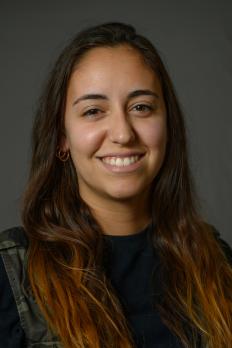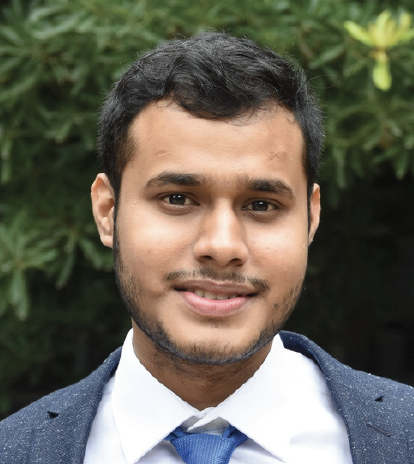Research Cafe: Natalie Losada & Souvik Mandal
Event Description
Research Cafe: April 26, 2023
3:00 - 4:00pm
679 Hoes Lane, Piscataway, NJ 08854 (Room #10)
Center for Advanced Biotech and Medicine, Busch Campus
Zoom option available.
~Snacks & coffee provided!~
Register to attend in person or on Zoom.
Students, faculty, and staff are invited to join the School of Graduate Studies as we enjoy, dialogue about, and learn from two fantastic graduate students -- Natalie Losada (Ph.D. student, Chemistry & Chemical Biology) and Souvik Mandal (Ph.D. student, Chemistry and Chemical Biology) -- who will share their research in a friendly and low-stakes setting. Learn more about the presenters and their presentations below!
---
1.) "HIV‑1 gp120 Antagonists Also Inhibit HIV‑1 Reverse Transcriptase by Bridging the NNRTI and NRTI Sites" by Natalie Losada

Abstract: HIV-1 infection is typically treated using ≥2 drugs, including at least one HIV-1 reverse transcriptase (RT) inhibitor. Drugs targeting RT comprise nucleos(t)ide RT inhibitors (NRTIs) and nonnucleoside RT inhibitors (NNRTIs). NRTI-triphosphates bind at the polymerase active site and, following incorporation, inhibit DNA elongation. NNRTIs bind at an allosteric pocket ∼10 Å away from the polymerase active site. This study focuses on compounds (“NBD derivatives”) originally developed to bind to HIV-1 gp120, some of which inhibit RT. We have determined crystal structures of three NBD compounds in complex with HIV-1 RT, correlating with RT enzyme inhibition and antiviral activity, to develop structure−activity relationships. Intriguingly, these compounds bridge the dNTP and NNRTI-binding sites and inhibit the polymerase activity of RT in the enzymatic assays (IC50 < 5 μM). Two of the lead compounds, NBD-14189 and NBD-14270, show potent antiviral activity (EC50 < 200 nM), and NBD-14270 shows low cytotoxicity (CC50 > 100 μM). ------TAKEN FROM::: J. Med. Chem. 2021, 64, 22, 16530–16540
Presenter Bio: I earned my bachelors in Chemistry from Rutgers in 2018 with a minor in Visual Art. Right after I went into my PhD program, once again in the Rutgers Chemistry department. I am now a 5th year PhD candidate in Eddy Arnold's lab group in the Center for Advanced Biotechnology and Medicine and Department, where I mainly use a technique called X-ray crystallography. I study the structures and mechanisms of interaction of HIV-1 proteins, such as reverse transcriptase, for potential drug development.
2.) "Ammonia and Beyond" by Souvik Mandal

Abstract: One of the most important technological inventions of the 20th century is the Haber-Bosch process (HB) for the synthesis of ammonia from atmospheric N2. However, HB is responsible for ca. 2% of global fossil fuel consumption and the co-production of commensurate quantities of CO2. In this context, we are investigating molecular catalysts with the ultimate goal of developing electrocatalysts for the reduction of N2 to ammonia. Reduction of N2 using molecular catalysts has gained significant attention since Schrock’s seminal report in 2003 and then a report by Nishibayashi in 2011. We have centered our approach on metal complexes that can bind and cleave N2 via a bimetallic pathway, and then accept protons and electrons to yield NH3. The Nishibayashi catalysts have been proposed, at least in some cases, to operate via dinitrogen-bridging Mo(I) (d5) fragments. Recent work by Schneider et al. demonstrates dinitrogen cleavage by Mo(II) (d4) fragments although the system failed to catalytically produce ammonia.
We are currently investigating the catalytic N2 reduction using a PNP-pincer-ligated Mo complex (PNP = Ozerov’s diaryl-based pincer ligand) and, in particular, the cleavage of the dinitrogen-bridged species, using electrochemical methods.
Presenter Bio: I am Souvik Mandal, a 4th year Ph.D. candidate in Prof. Alan Goldman's group in the Department of Chemistry and Chemical Biology at Rutgers University-New Brunswick. I have completed my B.Sc(Research) and M.Sc from the Indian Institute of Science, Bangalore, India in 2019 and joined Ph.D. program. I am interested in the activation and functionalization of small molecules utilizing homogenous metal complexes. In particular, currently, I am working on nitrogen activation to make ammonia, which is used as fertilizer. In this talk, I will share my understanding and our efforts for it. Outside the lab, I like to cook, travel and visit National Parks.
About Research Cafe
Research Café brings together the entire graduate student community of Rutgers University-New Brunswick/Piscataway campus to strengthen scholarly literacy and interdisciplinary research communication by providing a platform for budding researchers to connect, share their in-progress research or scholarship, and benefit from peer feedback in a friendly and low-stakes setting.
Research Café is a monthly, one-hour event to occur at rotating locations across the Rutgers New Brunswick/Piscataway campus (a Zoom option will be available, too). Each event will feature:
- Presentations (10-12 min. each) from two graduate students from across disciplinary areas ranging from engineering and biology to history and anthropology.
- A Q&A dialogue with peers and attendees.
- Conversational time over refreshments and snacks.
Sign up to attend in person or on Zoom at https://grad.rutgers.edu/research-cafe.
---
Questions? Contact the program coordinators:
Sonal Gahlawat at sg1389@scarletmail.rutgers.edu, Briana Bivens at bb770@grad.rutgers.edu, and Ramazan Güngör at rg835@grad.rutgers.edu.